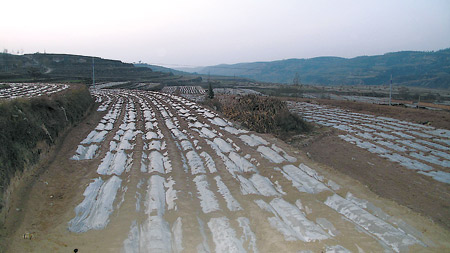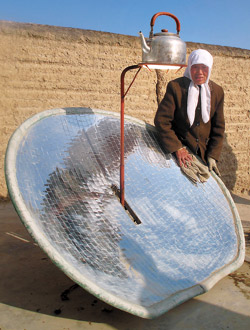Top Biz News
Thirsting for a solution
By Fu Jing (China Daily)
Updated: 2009-11-25 07:52
 Some of the wheat fields in Zhongzhuang village, also Gansu, that have been covered in plastic to aid the irrigation of crops during drought periods. [China Daily] |
Many parts of China, including Beijing, have seen three rounds of snowfall already this month. However, farmers in Dingxi, which is about 100 km from provincial capital Lanzhou, can only dream of snow.
"When I was young, the river was frozen by this time of year and the weather was really cold," said Ma Qi. It has been many years since the 70-year-old has needed a wadded jacket in November, though.
|
A woman in Huolianwan boils water with a solar stove. |
As average temperatures rise, locals have put off sowing their crops five days past the traditional date. In the region, wheat must be planted before Oct 1 as it can be killed in winter if it grows too fast.
Farmers have also used government subsidies to flatten slope fields, which can often take water away from crops.
However, plant diseases and pests have also been on the rise, plaguing fields already destroyed by drought. As a result, yields have reduced by a large margin. In Zhongzhuang, the yield of wheat per hectare is about 1,200 kg. The national average is five times that.
To combat the consequences of global warming, the provincial government ordered all crop fields in the province - roughly 333,000 hectares - to be formed into ridges overlaid with plastic.
"This is a provincial campaign to increase grain yield," said poverty-alleviation officer Su, who added all farmers in the province were being encouraged to use the technique when planting corn, wheat and potato.
He explained that there are two advantages to covering crops with plastic: the material can increase the temperature of soil in winter, preventing freezing and evaporation, and it also allows any rain or snow to trickle down to the furrows.
The technique can be effective in fighting drought conditions. Official statistics indicate that grain yield in Gansu has increased by about 20 to 50 percent in some regions following its introduction.
"However, the problem is that we still have not found a good way to degrade the plastic. The plastic is only good for two harvests, if the farmers leave it on after the second year it could do more harm than good," said Su.
One way has been to dig a well. It is hard to find underground sources of water and, after trying in several locations, Oxfam finally found a well 194 m below the surface in Huolianwan, a village 40 km from the city.
After the water is pumped to the highest point of the mountainous and dusty village, it flows to four supply points.
"This has helped relieve every family of one major job," said Lan Wuhua, 31, who added that before 2007 every household had to send someone daily to fetch water from a source several kilometers away.
She said the well had meant her husband could leave home to earn better wages in the city as a migrant worker.
"It was very hard to carry the water on your shoulder along the muddy, narrow roads, especially during storms. Five years ago, an old villager fell off a cliff while carrying drinking water in the rain. We are all lucky now we don't have to take the risk any more," said Lan.
For decades, farmers used sod, grass roots and branches as fuel, which further damaged the local ecosystem, burning precious bushes from the arid mountain region, and sent untold amounts of pollution into the atmosphere, said Lan.
According to the Gansu authorities, 60 percent of the province's rural residents now have access to clean energy sources, with 460,000 households using biogas systems and 788,000 cooking on solar stoves.
The progress has eliminated the use of 264,000 tons of coal and has reduced carbon dioxide emissions by 470,000 tons each year, say officials. Each solar stove is estimated to save from 600 to 1,000 kg of wood or one ton of coal annually.
Drinking water wells and solar stoves have changed Lan's life. Like her, many village women were unable to wash in hot water for weeks or even months at a time, and constantly drinking poor quality water from the mountain gorges made them prone to gynecological diseases.
"Now I can wash my face in hot water. The sunshine and underground water has returned my beauty," she said, smiling.














